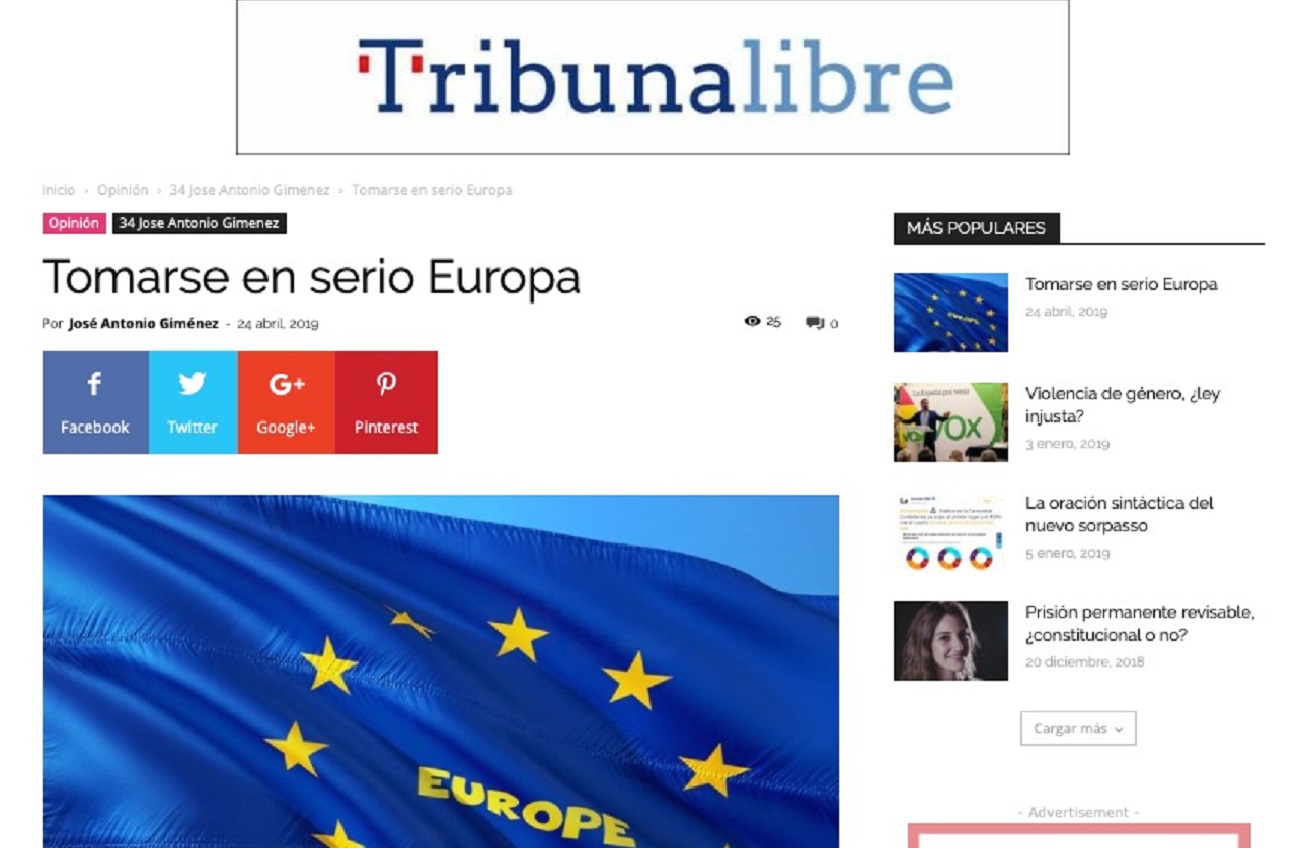
09 Apr Take Europe seriously
 Source: Tribuna Libre
Source: Tribuna Libre
Whether we like it or not, Europe is the future. We need the free movement of persons and goods, we need a single currency, and we need to negotiate with other economic powers on an equal footing, defending the singularities of each municipality. The only possible alternative to this reality is the isolation or the chaos in which the British Government is in. If this is what Brexit is about, it is better to stay in Europe.
Taking the position of Spain in Europe seriously means taking the future of the Spanish people seriously; to understand that the representation in the European Parliament is more than a golden retreat; is to be able to condition and/or balance the political and economic weight of our territory in the continent as a whole, and also in the global village that we live.
It is thus surprising that many parties turn their electoral list into an elephant cemetery and not into a frontline of technicians with knowledge about the European ecosystem and the lobbying that Brussels has become. Not understanding this means to not understand where the battles that affect our primary and secondary sectors will be resolved; in other words, the Spanish citizens.
The current Minister of Foreign Affairs, Josep Borrell, will be the head of the PSOE’s list. Another question is whether he is a voluntary candidate or whether his departure from the Executive is part of the hidden negotiation for the future formation of the Government, once these elections are over. And it is that, no matter how much is said in the electoral pre-campaign, it seems that the negotiation of the future executive has already begun without taking into account the opinion of the Spaniards and their vote. Consequently, now, it only remains to try to guide the voter to where it matters, as the fulfilment of electoral promises has never been the priority of many, apparently.
Nevertheless, Borrell is a reference point for Europeanism in Spanish socialism. He already headed the list in the European Parliament elections in 2004, the first time since 1989 that the Socialists were ahead of PP. He has also been president of the European Parliament, where he remained until 2009. His role as a dike against independence has given him a professional flashback. Now, it seems that the Catalan conflict wants to be taken to Europe, and Borrell can be an important asset in defending the Spanish reality.
In the same line of solidity comes the bet of Ciudadanos. Luís Garicano, apart from being an international well known economist, is also vice-president of the ALDE group. His only drawback, if we can consider it that way, is that he has not held a political position in his career within the party. What is unquestionable is the ability to form a team that has integrated the UPyD MEP, Maite Pagazaurtundúa, and the former spokesperson in the Congress of the PSOE, Soraya Rodriguez, reinforcing a first line in which the orange party demonstrates an integrating, progressive commitment with a clear European vocation; the experience and a polyhedral vision of Spanish sensibilities. Another skilful figure in parliamentary fencing is the case of Rodríguez, who is critical of the laxity of the defence of the State by of the current leadership of her former party.
Youth is provided by Podemos. The secretary of international relations and deputy in Congress, Pablo Bustinduy, will be the electoral poster. He has experience in Europe because he coordinated the Delegation of the purple formation in the European Parliament in 2014, date in which the party led by Pablo Iglesias reached representation for the first time, precisely in European elections. Escorted by the MEP Miguel Urban -who loses his leadership position, despite being the most voted- and Senator Idoia Villanueva, they have the difficult ballot to “green” their European successes.
Partido Popular is something else. The opposition spokesperson and former Health Minister, Dolors Montserrat, will be the visible face, escorted by the survivor, and also spokesperson for the blue formation in the European Parliament, Esteban González Pons; and the former president of the Community of Madrid, Ángel Garrido. Both of them did not have options in Valencia and Madrid, due to the staff renewal because of the cases of corruption, and they are accommodated or kept away to avoid the shadow of doubt haunting them.
At least, between so much outmoded politics and office without charge in the current ecosystem, the MEP and general secretary of the European Partido Popular, Antonio López Istúriz, endures. The rest is a long list of former ministers -Pilar del Castillo, Juan Ignacio Zoido or José Manuel Margallo, at least the latter a Foreign Minister- and members of the FAES Foundation, such as Ana Collado or Javier Zarzalejos.
And the rest of the candidates oscillate between the irresponsibility of Esquerra Republicana de Catalunya in its effort to opt for the former vice-president of the Generalitat accused by el procés, Oriol Junqueras; the possible electoral surprise thanks to the direct vote – and not with the Spanish Ley d’Hont system – of the president of PACMA, Silvia Barquero; the conformation of qualifications such as Europa Solidaria, in which you integrate or pile up -you choose the term- PNV, Coalición Canaria, Compromiso por Galicia, Geroa-Bai and Demòcrates
OValencians…; or the leadership of the former president of the Generalitat Catalunya, who fled from the Spanish justice system, Carles Puigdemont, from Junts per Catalunya, representing different platforms, and the Partit Demòcrata Europeu Català.
You judge who takes Europe seriously, and who takes the future of the Spanish people seriously.
***
Written by José Antonio Giménez
Specialist in Political Marketing
Sanserif.es

